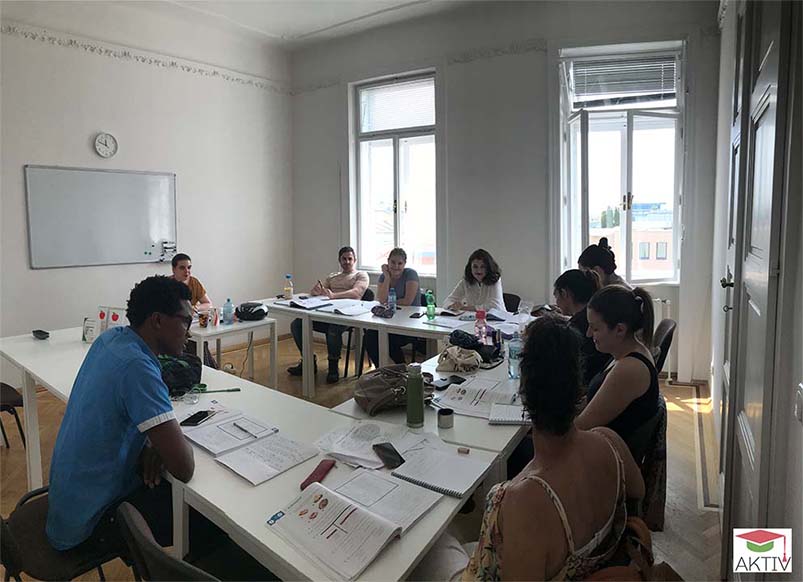Intensive German courses in Vienna A1, A2, B1, B2, C1 and C2
Our language school Aktiv in Vienna offers German language intensive courses in Vienna for beginners and advanced students.
Learn quickly with the intensive German courses in Vienna
If you want to learn the German language quickly and intensively, then our German language course in Vienna is optimal for you. We offer various German language courses to meet your personal requirements.
We have German language courses for beginners and advanced students
Whether you have previous knowledge of the German language or not, you are in the right place. We offer German courses for all levels. If you do not have any experience, you can join the German course for beginners. If you do have some experience, you can take our free placement test to determine your level and join the suitable German course. If you are not in Vienna yet you can take the test online, otherwise, we welcome you to visit us in our office any time.

German intensive courses in Vienna
German intensive courses take place from Monday to Friday in the morning. In the afternoon, you get to practice the language more and visit the beautiful city. German start first Monday of every month.
Level: A1, A2, B1, B2.1 + B2.2, C1.1 + C1.2, C2.1 + C2.2
Starting date: every first Monday of the month
Dates: Monday to Friday, 8:00-11:00/11:00-14:00/14:00-17:00/18:00-21:00
(*from 5 participants: 3×60 minutes per day, with 4 participants 2×60 minutes per day)
Duration: 4 weeks for A1, A2, B1, C1 or C2 / 8 weeks for B2.1 + B2.2. You can book the course for any number of weeks you prefer.
Price:
1 week: 239 €
2 weeks: 369 €
3 weeks: 489 €
4 weeks: 549 € (instead of 599 €)
8 weeks: 1098 € (instead of 1198 €)
| Intensive courses | ||
|---|---|---|
| January 2024 | February 2024 | March 2024 |
| 08.01.2024 | 05.02.2024 | 04.03.2024 |
| April 2024 | May 2024 | June 2024 |
| 02.04.2024 | 06.05.2024 | 03.06.2024 |
| July 2024 | August 2024 | September 2024 |
| 01.07.2024 | 05.08.2024 | 02.09.2024 |
| October 2024 | November 2024 | December 2024 |
| 30.09.2024 | 28.10.2024 | 25.11.2024 |
Your benefits
Before the German course begins, you can take a free placement test to determine your level. At the end of the course, you will receive a certificate. You will also be eligible to take an examinations such as ÖIF Exam, ÖSD Exam or EPD Exam. Our German courses prepare you for your studies at any German-speaking university in Austria.
Our German courses are also recognized for the granting of a visa to learn the German language.
Our teachers are native-speakers. When choosing our language trainers, we make sure that they are friendly and understanding. This will make your lessons fun as well as progressive and beneficial. Click here to sign up.
